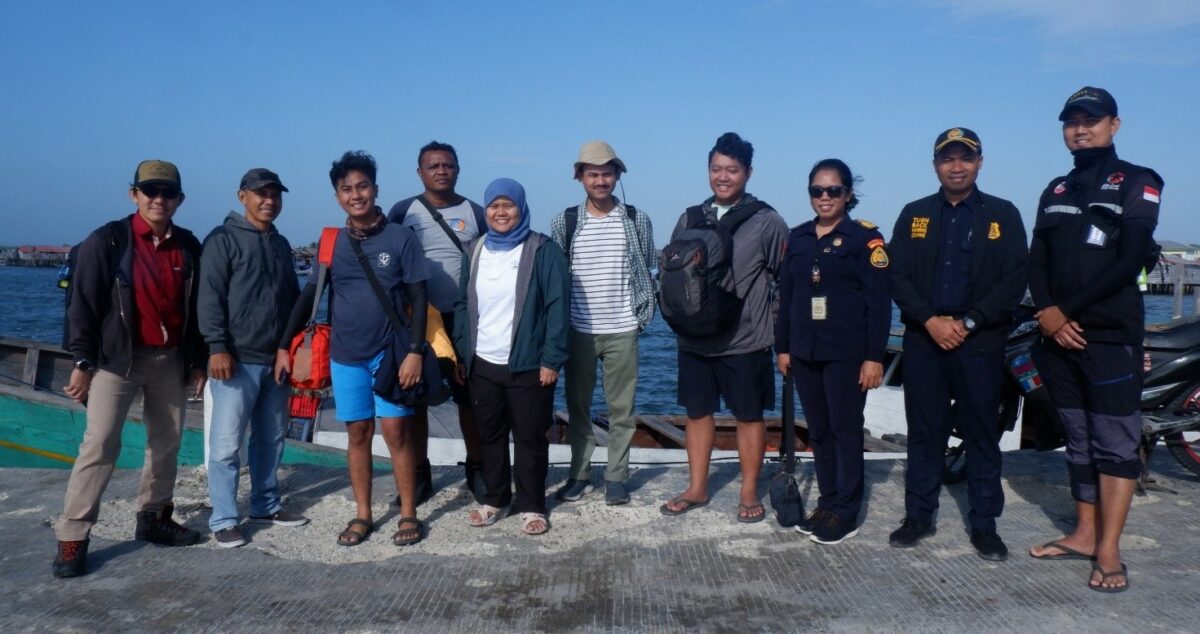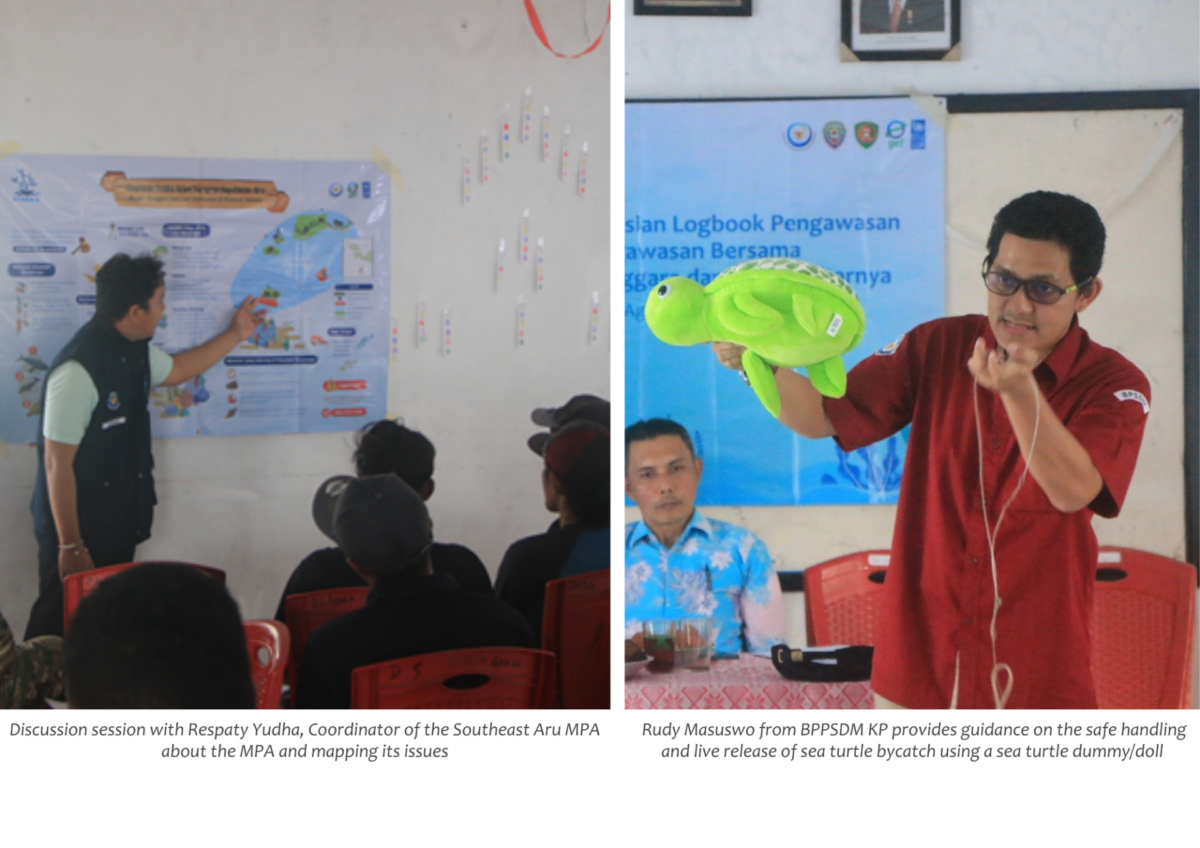The Aru Archipelago is home to some of the richest fishing grounds in Indonesia. Last year, the Ministry of Marine Affairs and Fisheries (MMAF) estimated that around 876,722 tonnes of demersal fish can be found in these waters, making them a hotspot for commercial fisheries. But this abundance also makes the region vulnerable to overexploitation in the form of Illegal, Unregulated and Unreported (IUU) fishing. In response, joint monitoring and surveillance efforts in the Southeast Aru Marine Protected Area (MPA) represent a critical element of ongoing community engagement in marine and fisheries resource management.
From 22-24 August 2023, the ATSEA-2 Project conducted a three-day intensive training session with community surveillance groups (known in Indonesia as kelompok masyarakat pengawas, or pokmaswas) in order to build these groups’ capacity in MPA surveillance and reporting, and raise community awareness of the important role they play in conservation.
The training was set up in collaboration with Indonesia’s Ministry of Marine Affairs and Fisheries (MMAF) and the National Marine Conservation Agency of Kupang, Dobo Unit. Participants came from various surveillance groups in Apara Village (known as Pokmaswas Gwer Katabar) and Karey Village (known as Pokmaswas Bintang Timur).

Conservation Agency of Kupang, Dobo Unit
On 22 August 2023, a team of 11 individuals from the ATSEA-2 Project, National Marine Conservation Agency of Kupang, Tual Fisheries and Marine Resource Surveillance, Ambon Fisheries Extension and Training Agency and the Maluku Fisheries and Marine Provincial Agency travelled from Dobo to Apara village, where a meeting was held in the village hall. The gathering included around 29 attendees, comprising pokmaswas, local community members, non-commissioned law enforcement personnel and other, similar organisations.
The event began with an opening speech by the village secretary, followed by remarks from Irwan Maulana, Sub-Coordinator of Operations at Tual Fisheries and Marine Resource Surveillance. Prior to the main presentation, ATSEA-2 Village Outreach Consultant, Iriansyah, conducted a game to illustrate the impact of sustainable fishing gear on local fisheries resources, underscoring the importance of such gear.

Respaty Yudha, Coordinator of the Southeast Aru MPA, then presented information and gathered perspectives on participants’ knowledge and current issues. Rita Garapara, the community welfare officer of the Village Consultative Body, expressed concerns about large boats entering the MPA, mainly for squid and fish, and impacting small-scale fishers. Yudha clarified that larger boats (>10 gross tonnage) can pass through MPAs, but any sign of illegal fishing or prohibited gear use should be reported to authorities like the Directorate-General of Surveillance and Control of Marine and Fishery Resources (PSDKP).
Aldy Malok, head of the Maluku Fisheries and Marine Provincial Agency, explained the provincial-level authority behind the establishment of pokmaswas, offered guidance on reporting mechanisms, highlighted key aspects to note during surveillance, provided some dos and don’ts during patrols, and gave some tips on surveillance form completion.
“Reporting is key when violations are identified, whether reported by pokmaswas or the local community,” noted Irwan Maulana from the Tual Fisheries and Marine Resource Surveillance. “Our primary role is to act as an extended ‘eye’ of the government, particularly in overseeing potential violations within the Southeast Aru MPA,” he added.
Rudy Masuswo, a fisheries extension officer from the Marine and Fisheries Human Resources Development and Extension Agency, provided a demonstration on the safe handling of bycatch, particularly Endangered, Threatened and Protected (ETP) species. He emphasised the necessary steps when handling sea turtles, such as measuring carapace length, identifying the species and taking photos.
On the second day, Pokmaswas Gwer Katabar led a joint surveillance activity in the vicinity of Apara village, as part of ongoing data collection, monitoring and oversight. During these activities, inspections were carried out on several fishing vessels anchored in the waters around Apara and Karey. It was discovered that some of these vessels lacked the required documentation, indicating potential violations related to IUU fishing.
On 24 August 2023, similar technical guidance was conducted among Pokmaswas Bintang Timur and Karey village stakeholders. As many as 33 participants were involved in this event but, due to adverse weather and unfavourable tidal conditions, the team was not able to perform joint surveillance. Nevertheless, all the necessary information and materials were delivered in a timely manner.
“I am grateful to receive training and mentoring from the ATSEA-2 team and the government,” said a pokmaswas member from Apara Village. “It’s a crucial initiative, especially for remote communities like ours; it strengthens our ability to protect the marine ecosystem, particularly in the Southeast Aru MPA.” Samaila from Karey Village added, “the government’s presence and training in Karey Village marks the start of collaboration with pokmaswas. I hope this training will enhance our effort to preserve our marine environment.”
By Sila Kartika Sari and Iriansyah


